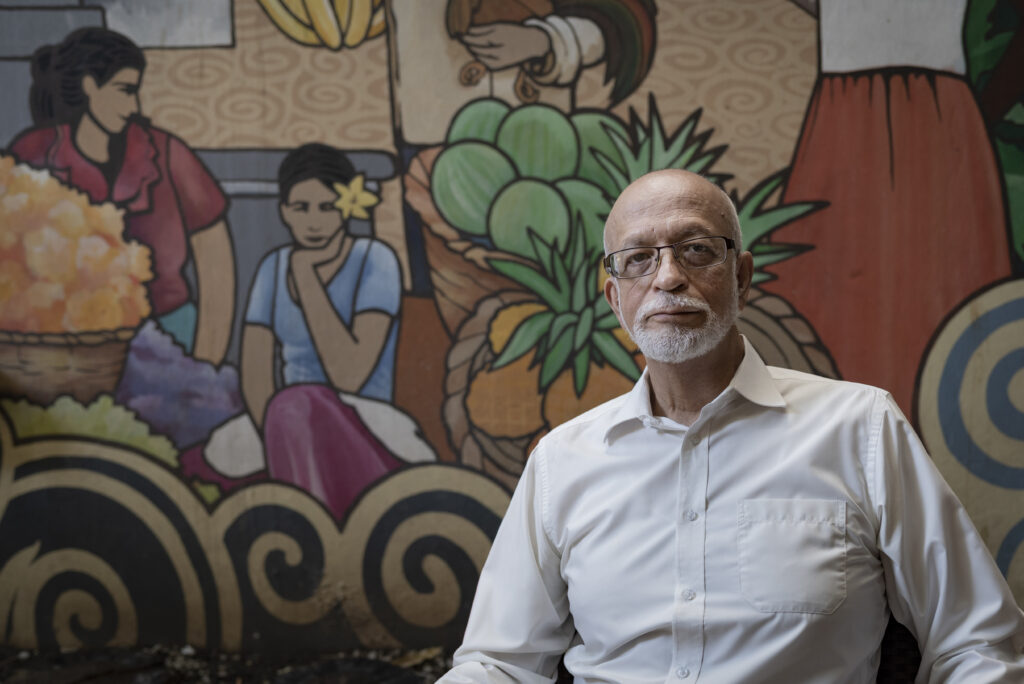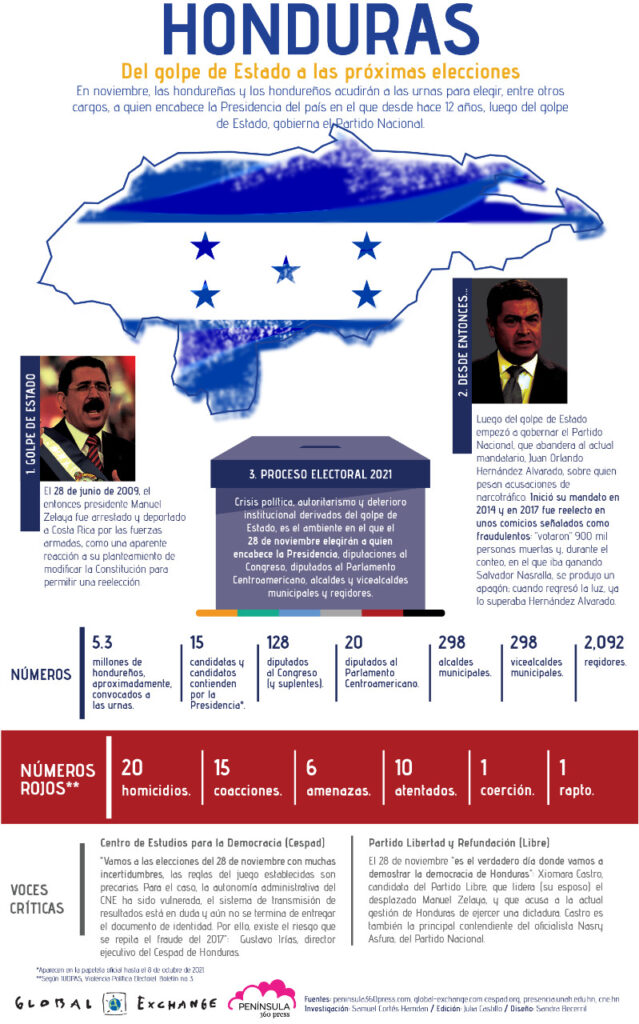Samuel Cortés Hamdan. Peninsula 360 Press /Global Exchange (@cilantrus)

[Gustavo Irías, executive director of the Center for the Study of Democracy (Cespad) of Honduras. Photo: Manuel Ortiz]
The November presidential election and the 2009 coup d'état
Honduras has been experiencing a political crisis for twelve years. A scenario of authoritarianism and institutional deterioration derived from the coup d'état that ended Manuel Zelaya's mandate in 2009.
Since then, the National Party, a traditional right-wing party founded at the beginning of the 20th century, has governed Honduras. The current president, Juan Orlando Hernández, who is accused of links to drug trafficking, is competing for political continuity through his candidate Nasry Asfura, although he claims in one of his main campaign slogans that his "project is different".
In addition to the political and social situation, the country is experiencing a generalized crisis of human rights, insecurity, migration, inequality and distrust in the separation of powers and in Hernández's government, challenging circumstances that add to the tragic historical instability of Central America - derived from European colonialism - in direct correlation with the violence, authoritarianism, gangs, drug trafficking and inequality fomented by Washington as part of its geopolitical strategies to maintain control in the region, and with daily consequences to this day.
In this context, Hondurans will go to the polls this November 2021 not only to elect the president, but also to renew the Congress and provide twenty legislators to the Central American Parliament, in addition to electing mayors, deputy mayors and councillors.
Difficult not to repeat the fraudulent behaviors of the 2017 election: Center for Democracy Studies
Two months before the elections, there are no certainties that guarantee the transparency of the elections and respect for the will of the people on November 28, 2021, Gustavo Irías, executive director of the Center for the Study of Democracy (Cespad) in Honduras, told Peninsula 360.
The main challenge is to ensure that the elections are conducted under international standards of transparency, fairness and competitiveness, which is precisely an attribute that in these last three electoral processes after the 2009 coup d'état not only have not been present, but have been deteriorating and represent a clear setback in the limited electoral process in Honduras," says the analyst.
The executive director of Cespad recognizes a general uncertainty, an extremely complex panorama.
Up to this moment everything points to the fact that we could be facing a blatantly fraudulent electoral process like the one in 2017. Although there is a small space to prevent this scenario from repeating itself," he ponders.
Added to this scenario of institutional crisis and historical fracture is the current violence in the electoral process, which has resulted in at least the murder of candidates and clashes between supporters of the competing parties, Irías said.
Alternation or continuity
The candidate of the Libertad y Refundación (Libre) party, Xiomara Castro, stands out in the polls just a few percentage points behind the ruling National Party's Nasry Asfura.
These two candidates summarize, in general terms, the political panorama of the November elections: the Libre candidate is a member of the political organization led by the ousted Manuel Zelaya, while the National Party candidate represents the political continuity of the power derived from the coup d'état.
The Libre Party claims a political orientation from which it accuses the current Honduran administration of exercising a dictatorship as the political heir of the 2009 coup d'état, while the National Party standard bearer bases part of his political discourse on assuring that he is different from Hernández.
Meanwhile, Asfura assures that "Papi is different" as one of the central lines of his proselytizing speech.
Institutional precariousness, political weakness
Beyond the narratives of the contenders, the Center for Democracy Studies recalls that Honduras will go to the polls with an unfinished process in the renewal of the identity card -only about 70 percent has been covered-, without agreements or technical strength in the preliminary counting system to begin to shed certainty in the first hours after the closing of polls, and without agreement on the procedure for fingerprint voting.
These electoral modernization initiatives have been systematically blocked by the National Party, with the complicit participation of the National Congress and the National Electoral Council (CNE) itself, accuses the head of Cespad.
In the face of all this, will Hondurans be able to find a democratic way out of this long political crisis?
*This article is part of a collaboration agreement between Peninsula 360 Press and the international human rights organization Global Exchange. Follow our coverage of the Honduran elections on our website and social media.



